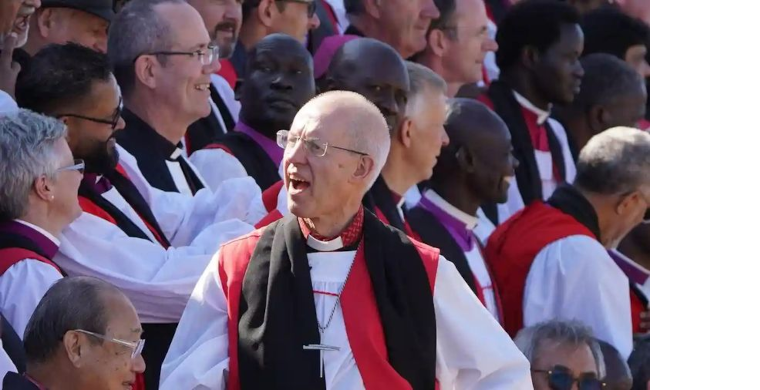OUR FUTURE IS GAFCON, NOT THE ARCHBISHOP OF CANTERBURY
By Chuck Collins
www.virtueonline.org
April 2, 2023
In his actions especially the last few months, the Archbishop of Canterbury has rendered himself as an unnecessary appendage to the worldwide "Anglican Communion." Our honorary head is unwilling to lead the Anglican Communion well, either refusing to face head-on the thorny theological issues that threaten the Communion with any biblical conviction or outright calling evil good and good evil.
In recent years it has become popular among some Anglicans and Episcopalians to define themselves in terms of their relationship to the Archbishop of Canterbury. To be "in communion with Canterbury," for some, is more important than maintaining continuity with historic Anglicanism and the teaching of Holy Scripture.
In recent years Anglicans have seen the authority of the Archbishop of Canterbury balloon in stature from being the first among equals (among Anglican primates and bishops) to almost pope-like status. This constitutes a stunning shift in understanding from a theological to an institutional identity of what it means to be "Anglican."
With uncanny foresight, the 1948 Lambeth Conference declared: "Former Lambeth Conferences have wisely rejected proposals for a formal primacy of Canterbury... authority which binds the Anglican Communion together is therefore seen to be moral and spiritual, resting on the truth of the Gospel, and on a charity which is patient and willing to defer to the common mind."
The Primates, also concerned about the exponential growth of Canterbury's power and influence, expressed this after their 2005 meeting in Dromantine, Ireland: "We also have further questions concerning the development of the role of the Archbishop of Canterbury, and the Council of Advice. While we welcome the ministry of the Archbishop of Canterbury as that of one who speaks to us as primus inter pares (first among equals) about the realities we face as a Communion, we are cautious of any development which would seem to imply the creation of an international jurisdiction which could override our proper provincial autonomy."
Even the recently retired Archbishop of Canterbury, Rowan Williams, spoke of the overstated view of his bishopric: "I think someone recently said that 'the path to heaven doesn't necessarily lie through Lambeth.' I agree entirely. The path to heaven lies solely through Jesus Christ our Savior and the unity he gives, and the only use and integrity of the instruments of unity [including the Archbishop of Canterbury] is when they serve that."
Seminary professor, Bill Witt, in an essay on this topic, pointed out that there are no references to the See of Canterbury in any of the classical Anglican writings (including the Articles of Religion and the Book of Common Prayer). He concluded that, "If one actually reads Cranmer or Jewel or Hooker et al, it becomes quite clear that (as they broke with Rome) they would have had no hesitation to break with Canterbury should Canterbury break with the doctrines and practices which encapsulate the gospel -- because the identity of Anglicanism does not lie in communion with an historic see, but in the doctrines and practices that adhere to the gospel."
All Anglicans agree that Canterbury is an historic see and the Archbishop of Canterbury is the symbolic head of the Anglican Communion, but to give him the kind of extraordinary authority over the church that he currently enjoys distorts what Anglicans have historically believed.
Anglicans believe that Canterbury's word is only as good as he upholds God's Word, and his authority only as strong as he upholds the Anglican heritage. To give our loyalty to a man or to an ecclesiastical structure is misplaced loyalty.
The 2008 Global Anglican Futures Conference (GAFCON), a meeting of Anglican primates, bishops and leaders from around the world, got it right when they stated: "While acknowledging the nature of Canterbury as an historic see, we do not accept that Anglican identity is determined necessarily through recognition by the Archbishop of Canterbury."
Being "Anglican," therefore, means a theology, a heritage, something we believe - not an ecclesiastical structure that we submit to.
The Archbishop of Canterbury can only sow confusion and discord by hoping the keep progressive, unanchored Anglicans in the boat of orthodox Christianity. There are no political solutions to theological problems. Our real hope is what the Prayer Book calls "the substance of the faith," and what the Bible calls "the faith once and for all delivered to the saints." This, and only this, gives us direction and hope for the future of the Anglican Communion.
The Rev. Canon Chuck Collins is the Director for the Center for Reformation Anglicanism. He has served as Rector of Episcopal and Anglican churches in Texas, Florida, New Mexico, and Arizona. He served as Canon Theologian in the Diocese of the Rio Grande under the Rev. Dr. Terence Kelshaw. He and his wife Ellen live in Cypress, Texas, near their four children and seven grandchildren. He is the author of Cranmer's Church: Then and Today (2021) Introducing Anglicanism in America, and Reformation Anglicanism: Biblical, Generous, Beautiful (2015).














